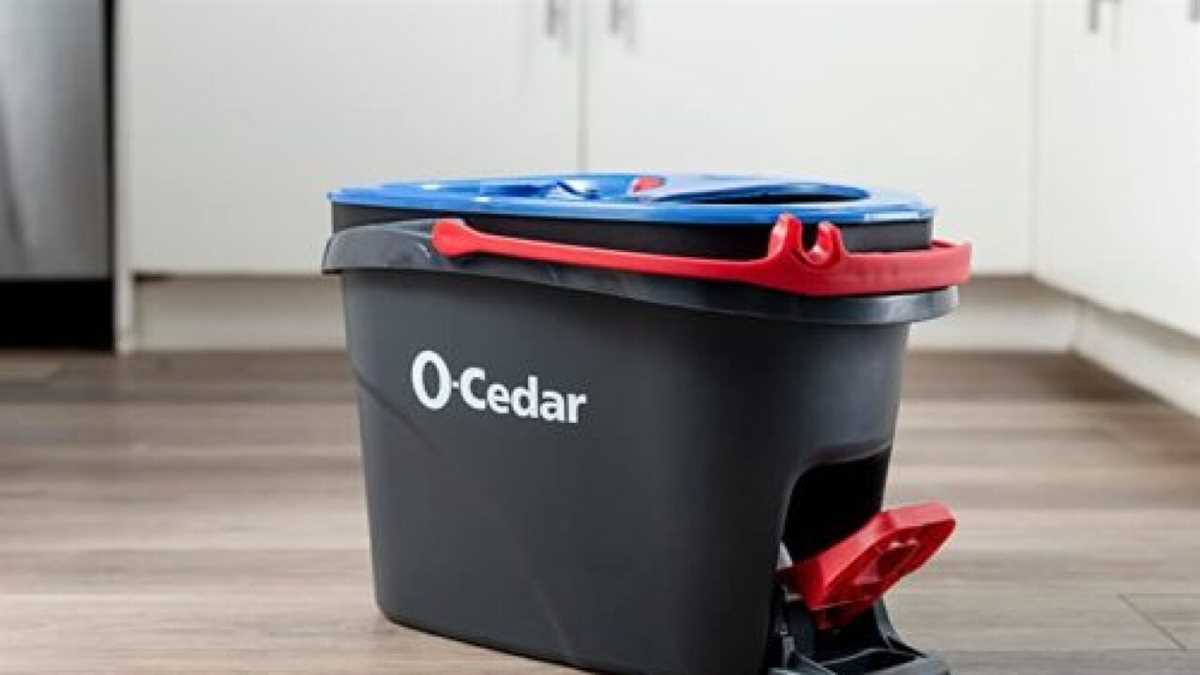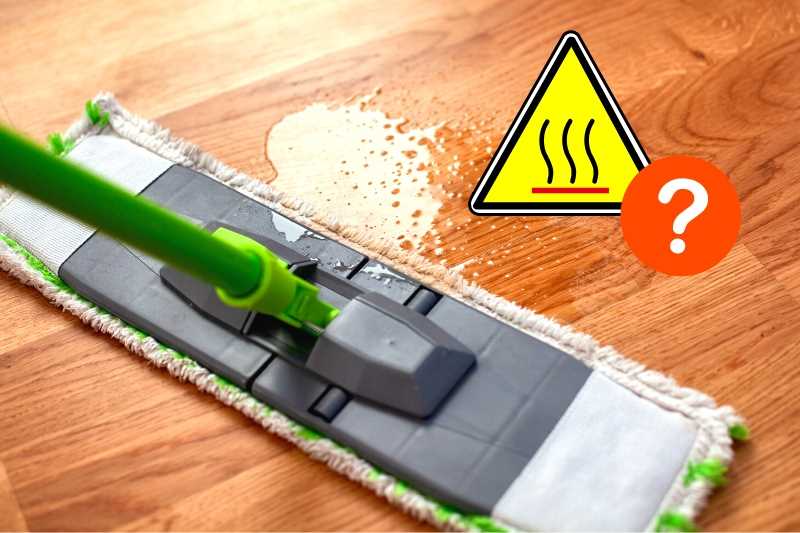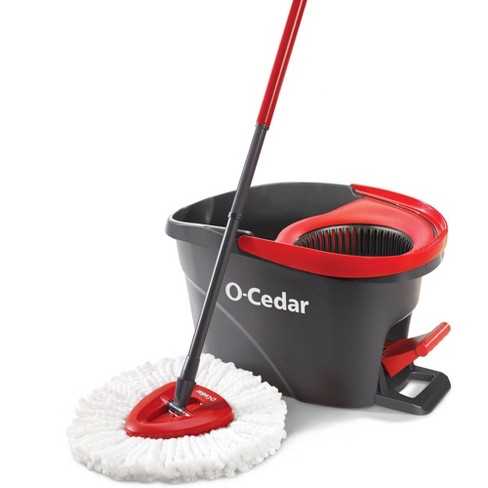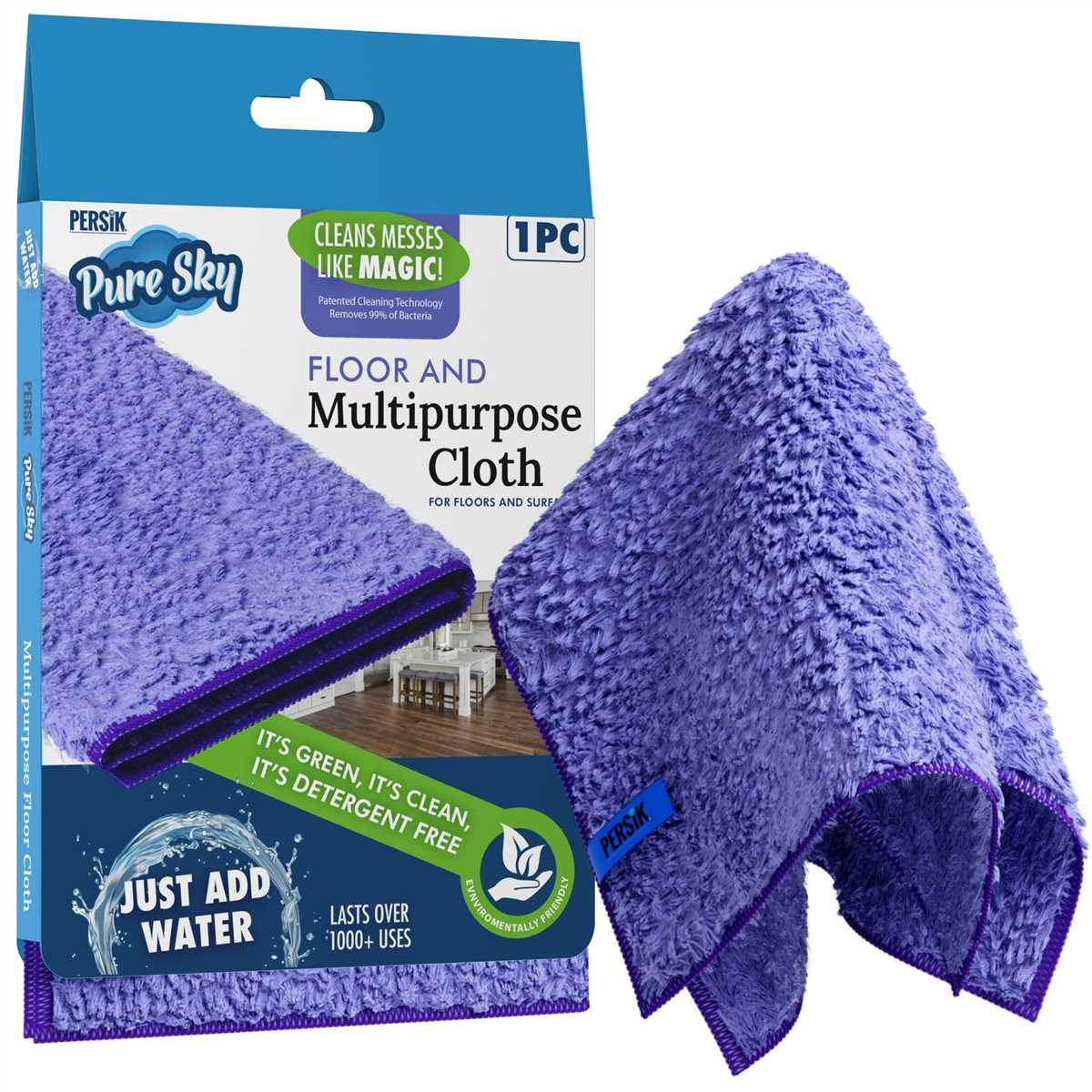




When it comes to cleaning our homes, we often rely on a variety of cleaning products to get the job done. From disinfectant sprays to floor cleaners, we have a myriad of options to choose from. But have you ever wondered if it’s possible to clean without using any of these chemicals?
Believe it or not, many people have discovered the power of water when it comes to keeping their homes clean. By using just water, they are able to effectively clean their floors, surfaces, and even windows without the need for any additional cleaning products. But is this really possible?
The answer is yes! With the right tools and techniques, you can mop and clean with just water. This not only saves you money on cleaning products but also eliminates the need for harmful chemicals in your home. Plus, it’s better for the environment!
How does it work?
Using just water for cleaning is made possible through the use of microfiber mop pads and cloths. These specially designed tools have tiny fibers that are able to trap and hold dirt, dust, and other particles without the need for chemical cleaners. When paired with just water, the microfiber pad or cloth becomes a powerful cleaning tool.
You might be wondering:
Does cleaning with just water really get rid of germs and bacteria?
The answer is yes! While water alone may not kill all bacteria and germs, it can effectively remove them from surfaces. The physical action of mopping or wiping with a microfiber pad helps to dislodge and lift bacteria and other contaminants, leaving your surfaces clean and free from harmful pathogens.
So, if you’re looking for a more eco-friendly and cost-effective way to clean your home, consider using just water. You might be surprised at its power!
The Benefits of Using Water as a Cleaning Agent
1. Eco-Friendly

One of the biggest benefits of using water as a cleaning agent is that it is entirely eco-friendly. Unlike many chemical cleaning agents, water does not release harmful toxins into the environment or contribute to air pollution. By using water instead of harsh chemicals, you can significantly reduce your carbon footprint and help to preserve the planet.
2. Safe for All Surfaces

Another advantage of using water as a cleaning agent is that it is safe to use on all surfaces. Whether you are cleaning delicate glassware or sturdy countertops, water is gentle enough not to cause any damage or leave behind residue. This makes it a versatile cleaning option that can be used throughout your home or office.
3. Cost-Effective
Using water as a cleaning agent is also highly cost-effective. Unlike chemical cleaning products that can be quite expensive, water is a readily available resource that costs next to nothing. By relying on water, you can save a significant amount of money on cleaning supplies over time.
4. Odorless
Water is completely odorless, which makes it an ideal cleaning agent for those who are sensitive to strong smells or suffer from allergies. Unlike chemical cleaning agents that often have a strong and lingering scent, water leaves behind no fragrance, ensuring a clean and fresh environment without any artificial odors.
5. Versatile
Water is a versatile cleaning agent that can be used for a wide range of cleaning tasks. From mopping floors and cleaning windows to washing dishes and wiping down surfaces, water can effectively tackle many cleaning chores. By using water, you can simplify your cleaning routine and reduce the number of products needed.
6. Easy to Use
Lastly, using water as a cleaning agent is incredibly easy. There is no need to mix or measure any chemicals, just grab a bucket of water and a cloth or mop, and you’re ready to start cleaning. This simplicity makes water a convenient and hassle-free cleaning option.
In conclusion, using water as a cleaning agent offers numerous benefits. It is eco-friendly, safe for all surfaces, cost-effective, odorless, versatile, and easy to use. By incorporating water into your cleaning routine, you can enjoy a clean and healthy environment while also reducing your impact on the planet.
Effective and Chemical-Free Cleaning
When it comes to cleaning your home, it’s important to find methods that are effective and safe for both your family and the environment. One of the best ways to achieve this is by using water as a cleaning agent. While it may seem surprising, water can be a powerful tool for cleaning a variety of surfaces in your home.
The Power of Water
Water is a universal solvent, meaning it has the ability to dissolve a wide range of substances. This makes it an effective cleaner for many types of dirt and stains. When used correctly, water can remove grease, grime, and even some stubborn stains without the need for harsh chemicals.
By using only water, you can avoid the potential health risks associated with traditional cleaning products. Many conventional cleaning solutions contain harmful chemicals that can irritate the skin, eyes, and respiratory system. By opting for chemical-free cleaning, you can create a safer environment for yourself and your loved ones.
How to Clean with Just Water
Cleaning with water is simple and straightforward. All you need is a microfiber cloth or mop and a source of water. Here’s how to clean different surfaces in your home using just water:
- Hard Floors: Fill a bucket with warm water and dip the mop in it. Wring out excess water, then mop the floor as you normally would. The microfiber mop head will effectively pick up dirt and grime, leaving your floors clean and shining.
- Countertops: Wet a microfiber cloth with water and use it to wipe the surfaces of your countertops. The cloth will trap bacteria and dirt, ensuring a thorough clean.
- Glass and Windows: Fill a spray bottle with water and mist it onto the glass surface. Use a microfiber cloth to wipe away dirt and streaks. For stubborn stains, you can add a dash of vinegar to the water.
- Bathroom Fixtures: Use a damp microfiber cloth to wipe down bathroom fixtures such as sinks, faucets, and showerheads. The water will help loosen dirt and grime, while the microfiber will trap it.
Conclusion

Using water as a cleaning agent can be a highly effective and chemical-free way to clean your home. Not only does it remove dirt and stains, but it also eliminates the need for harmful chemicals that can pose a risk to your health and the environment. By adopting chemical-free cleaning methods, you can create a safer and healthier living environment for yourself and your family.
Cost and Environmentally Friendly
Mopping with just water is not only an effective cleaning method, but it is also cost and environmentally friendly. Here are some reasons why:
Cost Effective
- No need to buy expensive cleaning products: Mopping with just water eliminates the need to purchase chemical-based cleaning solutions, saving you money in the long run.
- Reduced cleaning supply costs: Since you only need water, you won’t have to constantly buy and restock cleaning supplies, such as mops or disposable mop pads.
Environmental Benefits
- Reduced chemical usage: Using only water for mopping helps minimize the release of harmful chemicals into the environment, which is beneficial for both the planet and your indoor air quality.
- Less plastic waste: By not relying on disposable mop pads or other single-use cleaning products, you can help reduce plastic waste and landfill accumulation.
- Sustainable cleaning method: Mopping with just water aligns with sustainable practices by utilizing a renewable resource as a cleaning agent.
Overall, opting to mop with just water offers a cost-effective and environmentally friendly solution for maintaining clean and healthy floors.
Versatile Use on Different Surfaces
1. Hardwood Floors
Water is an excellent choice for cleaning hardwood floors. It is a gentle and natural option that will not damage the wood or leave behind any residue. Simply dampen your mop with water and use it to clean your hardwood floors. The water will effectively remove dirt, grime, and stains, leaving your floors looking clean and polished.
2. Tile and Grout
Water is also a great option for cleaning tile and grout. Its penetrating power can loosen and remove dirt, grime, and stains. You can use a mop or a cloth soaked in water to clean your tile floors. For grout cleaning, you can use a soft brush or a toothbrush and scrub the grout lines with water. The water will help lift and remove any embedded dirt or stains, leaving your tile and grout looking fresh.
3. Laminate and Vinyl Flooring
Laminate and vinyl flooring are versatile options that are commonly found in households. Cleaning these types of floors with water is safe and effective. You can use a damp mop or cloth to wipe away dirt and stains. Avoid using excessive amounts of water to prevent it from seeping into the seams and causing damage. With water, you can easily keep your laminate and vinyl floors looking clean and spotless.
4. Countertops
Water is a universal cleaner that can also be used on countertops. Whether you have granite, marble, quartz, or laminate countertops, water is a safe and effective choice for removing dirt, spills, and stains. Use a cloth or sponge soaked in water to wipe down the surfaces. For stubborn stains, you can let the water sit for a few minutes before wiping it away. The water will leave your countertops clean and shiny.
5. Glass and Mirrors
When it comes to cleaning glass and mirrors, water is your best friend. It can effectively remove fingerprints, smudges, and streaks without leaving behind any residue. Use a microfiber cloth or a squeegee soaked in water to clean your glass surfaces. The water will leave them crystal clear and spotless. For an extra shine, you can use a mixture of water and vinegar.
As you can see, water is a versatile cleaning agent that can be used on a variety of surfaces. Its natural properties make it safe and effective for everyday cleaning. Give it a try and discover the power of water!
Enhanced Safety for Children and Pets
Protecting your loved ones
When it comes to cleaning your home, the safety of your children and pets is a top priority. Traditional cleaning products often contain harsh chemicals that can be harmful if ingested or come into contact with delicate skin. Using water as the main ingredient for mopping not only ensures a clean home, but also provides enhanced safety for your loved ones.
Avoiding chemical exposure
By eliminating the use of chemical-based cleaners, you can significantly reduce the risk of accidental poisoning or allergic reactions. Water is a natural and safe alternative, making it the ideal choice for households with young children and pets. It allows you to maintain a hygienic living environment without exposing your loved ones to potentially harmful substances.
Gentle yet effective cleaning

Water may seem mild compared to traditional cleaning agents, but it is surprisingly effective at removing dirt, grime, and stains. When combined with the right cleaning equipment, such as microfiber mops or steam cleaners, water can easily tackle even the toughest messes. This gentle yet effective cleaning method ensures that your home remains clean and safe for your children and pets at all times.
Reducing indoor air pollution
Chemical-based cleaning products can release harmful fumes into the air, contributing to indoor air pollution. These fumes may irritate the respiratory systems of children and pets, causing discomfort or even more serious health issues. By using water as the primary cleaning agent, you can minimize the release of pollutants and create a healthier indoor environment for your family.
Peace of mind

Choosing to mop with just water provides peace of mind for parents and pet owners. You can rest easy knowing that you’re using a safe and natural cleaning method that doesn’t compromise the well-being of your loved ones. Enhanced safety for children and pets is just one of the many benefits of adopting water-based cleaning practices in your home.
Conclusion
When it comes to the safety of your children and pets, every precaution matters. By mopping with just water, you can enhance the safety of your home, reduce chemical exposure, and create a healthier living environment. Make the switch to water-based cleaning today and experience the peace of mind that comes with knowing your loved ones are protected.
Quick and Easy Cleaning Process
Step 1: Gather Your Supplies
- Microfiber mop
- Bucket or spray bottle
- Water
- Optional: All-purpose cleaner
Step 2: Prepare the Mop
Attach a clean microfiber cloth or pad to the mop head, ensuring it’s secure and flat.
Step 3: Dampen the Cloth
Moisten the microfiber cloth by either dipping it into a bucket of water or spraying it with water from a spray bottle.
Step 4: Begin Mopping
- Start at one corner of the room and work your way towards the exit.
- Use long, sweeping motions to push the mop across the floor.
- For stubborn stains or dirt, you may need to apply more pressure and go over the area multiple times.
- If desired, spray a small amount of all-purpose cleaner onto tough spots and wipe them with the damp cloth.
Step 5: Rinse and Repeat
- As the cloth becomes dirty, rinse it out in a bucket of clean water or swap it with a fresh one.
- Continue mopping until you’ve covered the entire floor surface.
Step 6: Allow to Dry
Once finished mopping, let the floor air dry or use a dry microfiber cloth to speed up the drying process.
Step 7: Clean Up
Empty and clean your bucket or spray bottle, and wash the microfiber cloth for next time.
Note:
Always refer to the manufacturer’s guidelines for your specific microfiber mop and cleaning products for any additional instructions or recommendations.
FAQ
Is it possible to clean with just water?
Yes, it is possible to clean with just water. Water can effectively remove dirt and grime from surfaces without the need for additional cleaning products.
What are the advantages of cleaning with water?
Cleaning with water has several advantages. It is a natural and chemical-free option, making it safe for both people and the environment. It is also cost-effective, as there is no need to purchase expensive cleaning products.
Can water effectively remove stains?
Yes, water can effectively remove many types of stains. However, some stubborn stains may require the use of additional cleaning agents or techniques.
Are there any surfaces that cannot be cleaned with water?
Water can be used to clean most surfaces, but there are a few exceptions. Surfaces that can be damaged by excessive moisture, such as untreated wood or certain types of electronics, should be cleaned with caution.












